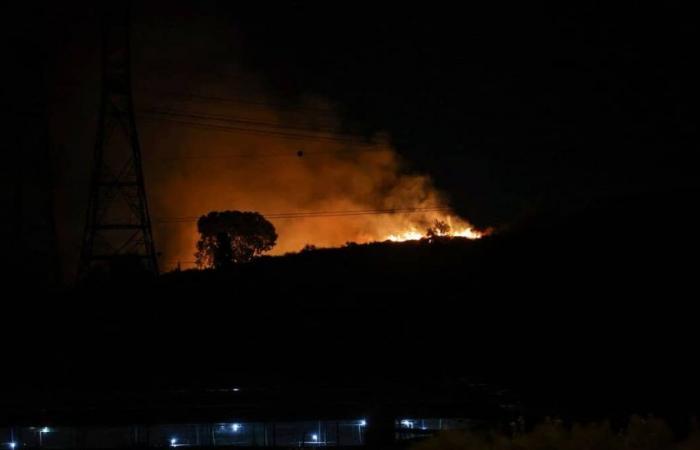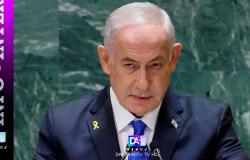Israel and its American ally threatened to retaliate for Tuesday’s attack by Iran, which fired around 180 missiles into Israeli territory to avenge the deaths of its allies, the leaders of Lebanese Hezbollah and Palestinian Hamas.
• Also read: LIVE | Follow the latest developments on the crisis in the Middle East
• Also read: Netanyahu: “Iran made a serious mistake tonight and will pay the price”
• Also read: Biden reaffirms full US support for Israel after Iranian attack
“Iran made a serious mistake this evening and will pay the price,” Israeli Prime Minister Benjamin Netanyahu said Tuesday evening. “We will stick to what we have set: whoever attacks us, we attack,” he threatened.
The Iranian attack on Israel, the second of its kind in almost six months, is “finished”, Tehran said, promising a “stronger and more powerful” response in the event of an Israeli response.
The United States, which helped its ally shoot down Iranian missiles, said it wanted to “coordinate” with the Israelis a response to Iran, their sworn enemy. “The United States fully, fully, fully supports Israel,” President Joe Biden told reporters.
The UN Security Council is due to meet urgently on Wednesday to discuss the escalation of hostilities in the Middle East.
In the midst of an Iranian attack, the Israeli army fired interceptor missiles over Jerusalem against projectiles, visible in their luminous traces, AFP journalists noted.
Dozens of detonations were heard and explosions were visible in the sky. Warning sirens sounded across the country and Israeli airspace was closed during the attack.
Numerous missiles intercepted
There were two minor injuries in Israel, according to emergency services. A Palestinian was killed in Jericho, in the occupied West Bank, by missile fragments, according to a Palestinian official.
When the sirens sounded, hundreds of people at West Jerusalem’s Central bus station took refuge in an underground parking lot. Some prayed, others checked their phones.
About an hour after the attack, the army called on the population to come out of shelters.
“Approximately 180 missiles were fired towards Israeli territory from Iran,” and a large number were intercepted by the “Iron Dome” defense system, the army said.
“In response to the martyrs of Ismail Haniyeh, Hassan Nasrallah and Abbas Nilforoushan (a deputy to the head of the Guards), we aimed at the heart of the occupied territories,” indicated the Revolutionary Guards, the ideological army of Iran, in reference to Israel.
They claimed to have struck “three military bases” located around Tel Aviv. After the attack, Tehran International Airport suspended flights.
Heavy gunfire erupted in the southern suburbs of Beirut after the Iranian attack. Palestinian Hamas welcomed “Iran’s heroic missile launches.”
“Decisive answer”
Iran exercised its “right to self-defense,” Iranian Foreign Minister Seyed Abbas Araghchi wrote on X. “We did this after showing immense restraint for almost two months, in order to make room for a ceasefire in Gaza,” he continued.
“Our action is over unless the Israeli regime decides to invite further reprisals. In this case, our response will be stronger and more powerful,” warned the minister.
Israel has been at war with Hamas in Gaza since an unprecedented attack by the Palestinian Islamist movement against Israeli territory on October 7, 2023. It is also fighting Lebanese Hezbollah which opened a front against Israel in support of Hamas, its ally, the following day from the start of the war.
On Friday, Hassan Nasrallah was killed in a devastating raid claimed by Israel in the southern suburbs of Beirut.
On July 31, Ismaïl Haniyeh, the leader of Hamas, was killed in an attack while he was in Tehran. Iran and Hamas blamed Israel.
On April 13, in response to a deadly strike attributed to Israel on the Iranian consulate in Damascus, Iran fired some 350 explosive drones and missiles towards Israel, the first direct attack of its kind. Most of the missiles were intercepted by Israel with the help of foreign countries, especially the United States.
On the other hand, the European Union, Spain, and Great Britain condemned the Iranian attack. UN chief Antonio Guterres has “condemned the widening of the conflict” in the Middle East.
Deadly attack in Tel Aviv
Just before the Iranian attack, six civilians were killed in an automatic weapons and stabbing attack in Tel Aviv, carried out by two shooters who were “neutralized,” according to police.
After the devastating blow to Hezbollah, several military leaders of which were killed by Israel, and after a week of Israeli strikes which left hundreds dead in Lebanon, Israel warned that the war was not over against the Lebanese movement.
“The Air Force continues to operate at full capacity and tonight it will continue to strike with power in the Middle East,” warned Israeli army spokesman Daniel Hagari.
The Lebanese Health Ministry announced Tuesday evening that 55 people had been killed and 156 others injured by “strikes by the Israeli enemy” over the past 24 hours in several regions of the country.
The disaster management unit announced before the publication of this daily report that 1,873 people had been killed in Lebanon over the past year.
On Tuesday, the Israeli army announced ground raids against Hezbollah in southern Lebanon and the mobilization of additional forces against this movement. She called on residents of 27 localities in southern Lebanon to evacuate.
The UN Interim Force in Lebanon, deployed on the border with Israel, nevertheless assured that it had not detected an Israeli incursion. The Lebanese army and Hezbollah have also denied such an incursion.
Ground raids “localized in Lebanon”
According to an Israeli official, these are “localized raids of a very limited scale”, intended to “repel threats against civilian communities in northern Israel”, bordering southern Lebanon and the target of Hezbollah fire.
The Israeli Air Force also carried out deadly strikes near Beirut and in southern Lebanon. Hezbollah said it fired rockets towards a base near Tel Aviv (center) and into northern Israel.
The Israeli army announced that it had struck “Hezbollah terrorist targets” in the southern suburbs of Beirut early Wednesday, after ordering residents of the area to evacuate. A Lebanese security source confirmed this bombing.
In mid-September, Israel intensified its strikes against Hezbollah, with the aim of stopping this movement’s firing towards its territory and allowing the return of tens of thousands of inhabitants to the North. More than 1,000 people have been killed since then, according to the Lebanese Ministry of Health.






